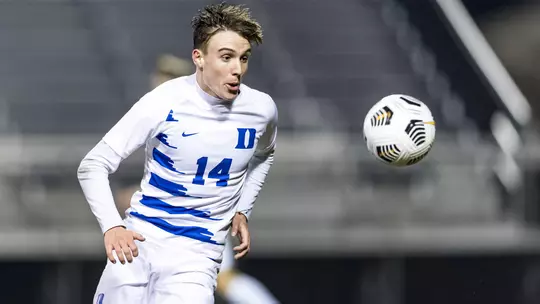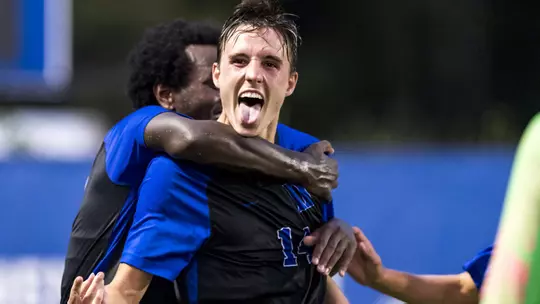Brotherly Love Pushing Stroud to Find Success

They say competition breeds excellence. Nobody proves this theory better than freshman midfielder Peter Stroud and the Duke men’s soccer team is the lucky beneficiary of his self-proclaimed 10 rating on a scale of 1-10 for competitiveness.
The youngest of four brothers [Dylan (27), Jared (24), Will (21), Peter (18)], who span about an eight-year age gap, Peter has honed his competitive nature over his 18-plus years of life. Whether it was finding ways to hang with his older brothers as a youngster or learning to keep his emotions and competitiveness in check years later when training with West Ham United of the English Premier League, one thing is certain – his work level and desire to succeed makes everyone around him better.
When asked to rate his competitiveness level on a scale of one to 10, Peter took about a half second to say 10 and then laughed as if there would be any other answer to the question. Someone can see that 10 rating all over his uniform every week as he regularly finishes a 90-minute battle with grass stains or field paint on his shorts and jersey. And that’s not to mention the eight or nine miles of running he did, according to the post-match analysis from the team’s fitness tracking Catapult system.
“I refuse to believe that [I run eight or nine miles] because it goes by so quick,” said Peter about his postgame mileage totals. “I do feel like that’s part of my game, putting myself around the ball and impacting the game because there are different flows of the game. Sometimes the other team can be bossing your team around a bit and sometimes it takes someone on your team to set the tone and get the boys going. I guess it’s eight to nine miles, but it doesn’t feel like it. You don’t feel it during the game.”Peter Stroud
“I refuse to believe that [I run eight or nine miles] because it goes by so quick,” said Peter about his postgame mileage totals. “I do feel like that’s part of my game, putting myself around the ball and impacting the game because there are different flows of the game. Sometimes the other team can be bossing your team around a bit and sometimes it takes someone on your team to set the tone and get the boys going. I guess it’s eight to nine miles, but it doesn’t feel like it. You don’t feel it during the game.”
Peter and his brothers have always been going a mile a minute and most of it involved a soccer ball. Their father, Stephen, was a native of England before pursuing his college education in the United States, and he and his wife Karen put the boys in the sport early on. Dylan went on to play at Washington and Lee, while Jared was a standout at Colgate University and currently is a member of Austin FC in MLS after a successful one year with the New York Red Bulls. Will is a junior defender at Colgate where he has started 18 of his 20 games.
While Peter says they tried other sports, none of them stuck, so soccer it was for the Stroud boys. They will mix in a competitive game of basketball here and there, but it was always going to be a soccer family.
“Growing up we would always play in the basement,” Peter said. “We would have little nets and we’d play on carpet with walls on the side. It would be me and the oldest one against the two middle ones. The games would always end with me running upstairs crying because of an injury. My mom said I’d come upstairs with tears on my face, but I wouldn’t say anything to them, I’d just grab ice and run back downstairs.”
Over a decade later, little has changed as Peter often bears the brunt of an opponent. However, despite getting knocked down, he always bounces back up and returns to battle.

While having a strong competitive nature has its benefits, being able to control it is even more important. Reining it in admittedly is something Peter had to learn a little later in his youth career.
Peter, like his brothers, took to soccer immediately and vice versa. He started out at as a U8 Player Development Academy with his first soccer memory playing center back for the club. A few years later, following in his brothers’ footsteps, he joined New York Red Bull Academy.
In the meantime, Peter garnered notice from the U.S. Youth National teams, earning 12 international caps with the U15 squad and 15 with the U17 team.
Then perhaps, the biggest honor came calling as West Ham United of the English Premier League showed interest in Peter. He pursued the opportunity from a lifetime in England and quickly adapted thanks in part he thinks to the life training from his older brothers.
“When I went to England from America, the [Red Bulls] Academy I wouldn’t say was easy, but it’s a different kind of soccer in England. It’s more physical so the competitiveness I got from my brothers helped me fit in a lot of quicker than a lot of people usually do in that environment.”Peter Stroud
“When I went to England from America, the [Red Bulls] Academy I wouldn’t say was easy, but it’s a different kind of soccer in England. It’s more physical so the competitiveness I got from my brothers helped me fit in a lot of quicker than a lot of people usually do in that environment.”
Although Peter adjusted well to the style of soccer, he quickly learned the fire he played with alongside his brothers didn’t necessarily translate in a positive way at West Ham.
“[Going to West Ham] was kind of a reality check,” Peter said. “I kind of had to check my competitiveness because, especially in those environments where every game matters, I found myself getting a lot of yellow cards and sometimes red cards. I had to kind of tone it back, because it wasn’t good for the team. It was a good reality check in a way. You can be competitive, but sometimes you need to tone it down a bit and be smart about it.”
Peter made his debut with the U18 West Ham United squad at age 16 in a 1-0 victory over Swansea City. He made his first appearance with the U23 side against the same club in a Premier League 2 match a couple months later.
The 5-10 midfielder took all the lessons he learned and developed on and off the field from Red Bull Academy and West Ham to Durham where he’s had an immediate impact on the Blue Devils in practices and games. A starter in all 13 games, Peter is Duke’s engine on the field. He ranks third on the team in minutes played and has been credited with two assists.
However, sometimes it’s the plays that don’t find their ways onto the stat sheet that are the most important as Peter’s vision and skill combined with his work rate have been nightmares for opponents. His ability to disrupt teams was on full display most recently at Virginia Tech as his pressure and ability to read the game forced the Hokies into turnovers that resulted in the Blue Devils’ first two goals in the 4-2 victory.
However, perhaps more important than his in-game play is that Peter raises the level of training day in and day out for the Blue Devils. He’s effectively the creator of the competition that will breed future success. It’s not only his technical and tactical skills that raise the level of practice, Peter takes a methodical approach to daily training which is a lesson he learned while with West Ham.
“I took away a lot of things from other players [at West Ham],” Peter said. “Showing up to train and doing it properly. In England, the trainings weren’t very long and it was your job to get the best out of it so I kind of learned to go into training every day with goals in mind. It’s not just having yearly goals but to have everyday goals in terms of training. There is always an opportunity to learn from yourself and then take it into training that week.”
Peter and the Blue Devils will continue to learn and work toward these daily goals heading into the last four games of the 2020-21 regular season. One thing you can be sure of is that Peter will be in the middle of it all.

